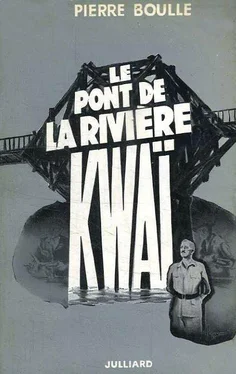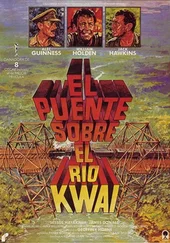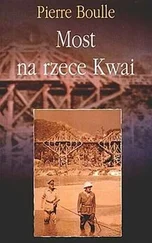That, at least, was how it appeared, in a rather exaggerated light perhaps, to Colonel Green, who disagreed with the theory of art for art’s sake being applied to intelligence matters. He muttered some inaudible remark as he thought of some of the previous ventures; then, in view of the miraculous unanimous agreement on the present scheme, it was almost with disappointment that he felt he had to admit that for once the services had done something useful. He consoled himself with the thought— not entirely a fair one—that the information contained in the report had been known to everyone in India for years. Finally he went through it again and made a mental summary of it, with the idea of taking action on it.
“The Burma-Siam railway is now under construction. Sixty thousand Allied prisoners, drafted by the Japanese into a labor corps, are being employed on it and are working under ghastly conditions. In spite of appalling losses, it is calculated that the task, which is of considerable importance to the enemy, will be completed in a few months. Herewith a rough sketch map. It shows several river crossings by means of wooden bridges…”
At this point in his summary Colonel Green felt in good form again and almost grinned with pleasure. He went on:
“The Siamese people are extremely discontented with the ‘liberators,’ who have requisitioned all the rice and whose troops behave as though they were in occupied territory. The peasants in the railway area in particular are showing signs of unrest. Several senior officers of the Siamese army, and even some members of the royal family, have recently established contact with the Allies and are prepared to launch an anti-Japanese underground movement, for which countless peasants have volunteered. They request both weapons and instructors.”
“No doubt about it,” Colonel Green decided, “I’ll have to send a team into the railway area.”
Having made his decision, he pondered for some time on the various qualities that would be required by the leader of such an expedition. After ruling out a number of possible candidates, he called for Major Shears, an ex- cavalry officer who had been transferred to Force 316 at the time that special unit had been formed and was, in fact, one of its founder members. This private army had only seen the light of day thanks to the persistent efforts of a few individualists and the reluctant support of a handful of military experts. Shears had only just arrived from Europe, where he had successfully completed several tricky missions, when he had his lengthy interview with Colonel Green. The Colonel gave him all the information available and outlined the general purpose of his mission.
“You’ll take only a few stores in with you,” he said. “The rest will be dropped to you as and when you need them. About the actual operation, you’ll be able to see for yourself on the spot, but don’t be in too much of a hurry. I think it’ll be best to wait till the railway’s finished and deliver a single powerful blow rather than risk giving the whole show away by a series of minor attacks.”
There was no need to specify what form the “operation” would take or what type of stores would be used. The raison d’etre of “The Plastic and Destructions Co., Ltd.” made a fuller explanation superfluous.
Meanwhile, Shears was to get in touch with the Siamese, make sure of their good intentions and loyalty, then start training the partisans.
“As I see it, you’ll need a team of three,” said Colonel Green, “for the moment, at any rate. How does that strike you?”
“That seems quite reasonable, sir,” Shears agreed. “We need at least a nucleus of three Europeans. Any more, and we might present too big a target.”
“That’s settled, then. Who do you plan to take in with you?”
“I suggest Warden, sir.”
“Captain Warden? Professor Warden? You certainly don’t believe in half measures, Shears. With you, that’ll make two of our best agents.”
“I understood it was an important mission, sir,” was Shears’s noncommittal reply.
“It is. It’s a very important mission, from the political as well as the operational point of view.”
“Warden’s just the man for that, sir. An ex-professor of Oriental languages. He speaks Siamese and will be able to get on with the natives. He’s a level-headed sort of chap and doesn’t get the wind up—at least, not more than most of us.”
“You can have Warden. Now what about the third?”
“I’ll think it over, sir. Probably one of the youngsters who’ve been through the course. I’ve seen several who look quite promising. I’ll let you know tomorrow.”
Force 316 had established a school in Calcutta where the young volunteers were trained.
“Right. Here’s the map. I’ve marked the possible parachute landings and hide-outs where the Siamese say you’ll be able to lie up without any risk of being discovered. We’ve already done the air reconnaissance.”
Shears bent over the map and the aerial photographs. He carefully studied the area which Force 316 had chosen as his theater of unorthodox activity in the wilds of Siam. He felt the thrill which seized him each time he embarked on a new expedition into unknown territory. There was something exciting about any Force 316 mission, but this time the attraction was intensified by the wild nature of the jungle-clad mountains inhabited by lawless tribes of hunters.
“There seem to be several suitable spots,” Colonel Green went on. “For instance, this isolated little hamlet not far from the Burmese border, about two or three days’ march from the railway, apparently. According to the sketch map, the railway there crosses a river—the River Kwai, if the map’s right. The bridge there will probably be one of the longest on the line.”
Shears smiled, as his C.O. had done, at the thought of the number of bridges across the river.
“I’ll have to study the question more closely, of course; but for the moment, sir, I should think that place would make a perfect H.Q.”
“Right. Now all we’ve got to do is arrange for the drop. That’ll be in three or four weeks, I should think, if the Siamese agree. Ever done a jump?”
“Never, sir. Parachuting wasn’t included in the course until after I’d left Europe. I don’t think Warden has, either.”
“Hang on a moment. I’ll see if the experts can put you through a few training jumps.”
Colonel Green seized the telephone, asked for a certain R.A.F. office, and told them what he wanted. He listened for some time and did not seem at all pleased with what he heard. Shears, who kept his eyes on him throughout the conversation, could see how his mood changed.
“That’s really your considered opinion, then?” Colonel Green asked.
He frowned as he listened to the reply, then hung up the receiver. After a moment’s hesitation, he finally made up his mind and said:
“Do you want to know the experts’ opinion? It’s this. They just said: ‘If you absolutely insist on your chaps doing some training jumps, we’ll make the necessary arrangements. But we honestly wouldn’t advise it—not unless they can spare six months for a proper course. Our experience of missions dropping into this sort of country can be summed up as follows: if they do only one jump, you know, there’s a fifty per cent chance of an injury. Two jumps, it’s eighty per cent. The third time, it’s dead certain they won’t get off scot free. You see? It’s not a question of training, but the law of averages. The wisest thing would be for them to do just the one jump—and hope for the best.’ Well, that’s what they said. Now it’s up to you.”
“One of the great advantages of the modern army, sir,” Shears calmly replied, “is that there are experts to solve all the problems for us. It’s no good thinking that we know better than them. What they’ve said obviously shows common sense as well. I’m sure it will appeal to Warden’s logical mind; he’s bound to agree with it. We’ll take the advice and do the one jump—and hope for the best.”
Читать дальше











